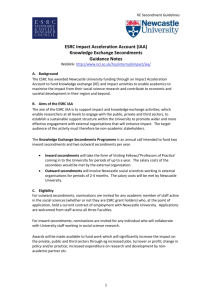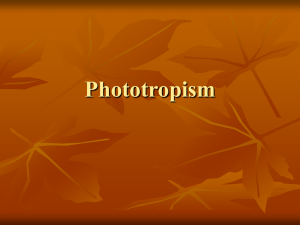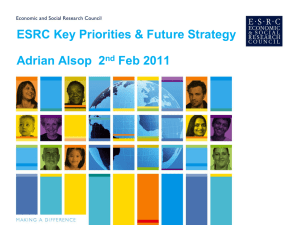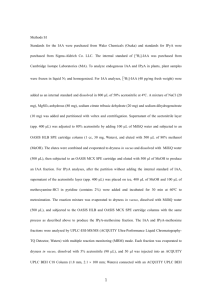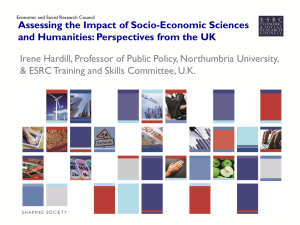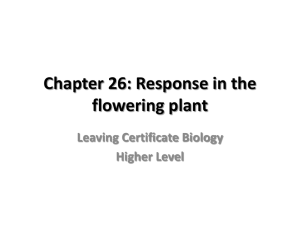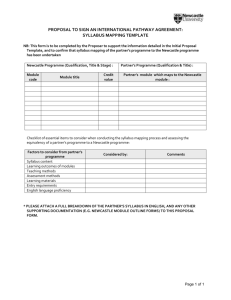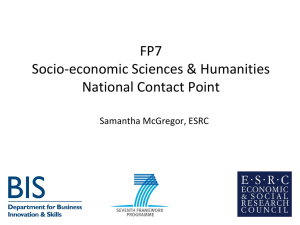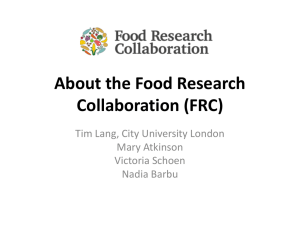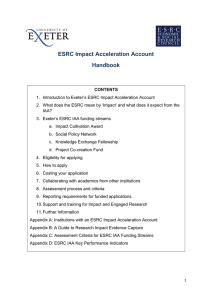Arts and Humanities Research Fund - Guidance Notes
advertisement
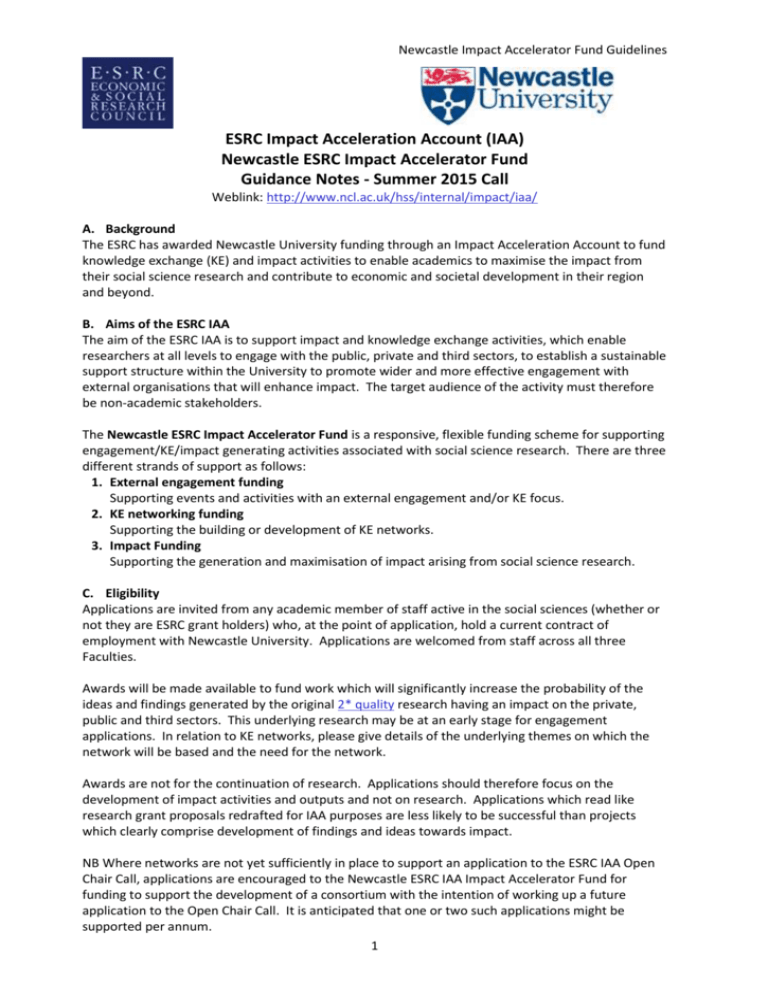
Newcastle Impact Accelerator Fund Guidelines ESRC Impact Acceleration Account (IAA) Newcastle ESRC Impact Accelerator Fund Guidance Notes - Summer 2015 Call Weblink: http://www.ncl.ac.uk/hss/internal/impact/iaa/ A. Background The ESRC has awarded Newcastle University funding through an Impact Acceleration Account to fund knowledge exchange (KE) and impact activities to enable academics to maximise the impact from their social science research and contribute to economic and societal development in their region and beyond. B. Aims of the ESRC IAA The aim of the ESRC IAA is to support impact and knowledge exchange activities, which enable researchers at all levels to engage with the public, private and third sectors, to establish a sustainable support structure within the University to promote wider and more effective engagement with external organisations that will enhance impact. The target audience of the activity must therefore be non-academic stakeholders. The Newcastle ESRC Impact Accelerator Fund is a responsive, flexible funding scheme for supporting engagement/KE/impact generating activities associated with social science research. There are three different strands of support as follows: 1. External engagement funding Supporting events and activities with an external engagement and/or KE focus. 2. KE networking funding Supporting the building or development of KE networks. 3. Impact Funding Supporting the generation and maximisation of impact arising from social science research. C. Eligibility Applications are invited from any academic member of staff active in the social sciences (whether or not they are ESRC grant holders) who, at the point of application, hold a current contract of employment with Newcastle University. Applications are welcomed from staff across all three Faculties. Awards will be made available to fund work which will significantly increase the probability of the ideas and findings generated by the original 2* quality research having an impact on the private, public and third sectors. This underlying research may be at an early stage for engagement applications. In relation to KE networks, please give details of the underlying themes on which the network will be based and the need for the network. Awards are not for the continuation of research. Applications should therefore focus on the development of impact activities and outputs and not on research. Applications which read like research grant proposals redrafted for IAA purposes are less likely to be successful than projects which clearly comprise development of findings and ideas towards impact. NB Where networks are not yet sufficiently in place to support an application to the ESRC IAA Open Chair Call, applications are encouraged to the Newcastle ESRC IAA Impact Accelerator Fund for funding to support the development of a consortium with the intention of working up a future application to the Open Chair Call. It is anticipated that one or two such applications might be supported per annum. 1 Newcastle Impact Accelerator Fund Guidelines D. Extent of the ESRC Impact Accelerator Fund 1. The Faculty has allocated c £75,000pa across all three strands. 2. £10,000pa will be specifically dedicated to KE network and engagement funding. 3. IAA awards are made on the basis of individual project needs. We expect to fund approximately 20 awards per annum, across the three strands and the three calls pa taken together, in the range of £1,000 - £10,000 per award (average £4k). 4. Applicants should consider co-funding (cash or in-kind) of applications where possible. This type of commitment not only increases the reach of the funding, but commits external partners to engage with the activities developed by researchers. Applicants are expected to demonstrate in their proposals that there is a genuine commitment from external partner organisations. 5. The following are excluded from this fund: Basic research that does not include substantive user engagement Knowledge Transfer Partnerships 6. All costs must be fully and clearly justified and may include the following: a) Reasonable travel, accommodation and subsistence costs: in accordance with the University expenses manual at: http://www.ncl.ac.uk/internal/finance/expenses/regulations/index.htm b) Equipment: Consumables directly related to the project may be eligible for funding, but must be fully justified. Where items of equipment are requested at substantial cost and are to be retained within the School, the School would ordinarily be expected to contribute 50% of the cost of these items. c) Salaries: For research fellows and research associates or exceptionally for teaching buy out for T&R staff or for salary costs of external partners where the activities proposed don’t form part of the organisation’s normal remit/services (NB this is likely only to apply to third sector organisations). If research fellows or associates are supported by research grants from bodies outside the University, the terms and conditions of their award/appointment must not preclude their acceptance of additional research funding. d) Other: The Panel will consider applications for costs such as registration costs at events, production of professional materials, room bookings, catering etc. E. Assessment Criteria 1. Quality of the proposal; is it academically rigorous in terms of its methodology, reach and significance and generated by 2* quality research? In relation to KE networks, are there clear underlying themes and a clear need for the network? 2. Are there clear objectives and milestones and are the proposed activities deliverable within the timespan defined? 3. Are the proposed societal and economic outcomes and outputs of the proposal realistic and appropriate? 4. Does the proposal represent Value-for-Money? 5. Will the proposal develop sustainable relationships with an external organisation (s) and/or community (s) and/or research-user(s) and/or practitioner(s)? 6. Will the proposal leverage additional resources (both financial and non-financial) from an external organisation (s) and/or community (s) and/or research-user(s) and/or practitioner(s)? 7. Is the proposal significantly (50%+) within the ESRC Disciplinary Remit? 8. Does the proposal align to and support the ESRC IAA key performance indicators? 9. Will the proposal enhance the University’s research culture and environment? 2 Newcastle Impact Accelerator Fund Guidelines 10. The Awards Panel will adopt an open and expansive appetite for risk, innovation and entrepreneurship when considering proposals, in balance with the need for securing Valuefor-Money. This approach is designed to encourage and support proposals that are novel in design and whose ultimate success is consequently more uncertain than more traditional and/or conventional impact and engagement projects. F. Process 1. There will be three competitions during each academic year. 2. Applications must be made on the application form and can be under one, two or all three of the funding strand headings. 3. There is no limit to the number of applications from each School per competition. 4. Applicants are required to discuss their project with the Faculty’s Research Impact Officer, Dr Angie Scott and your School Impact Champion before submission. 5. Applicants should cost their proposals in MyProjects Proposals in liaison with their School office. Please contact Clare.Graham@ncl.ac.uk / ext 85807 if you have any queries. 6. Applicants are required to discuss their project with their Research Director and Head of School in relation to strategy and staffing implications. Applications should have support from the School and must be ranked by the Director of Research, confirmed by the Head of School. Impact applications should be ranked separately from applications exclusively for KE networks and/or engagement. 7. Standard conflict of interest considerations will apply. Where the Research Director is an applicant or a collaborator on the relevant project, he or she will not be involved in the process nor have access to the relevant School documentation, and the Head of School will submit the form in lieu of him or her. Where the Head of School is an applicant or a collaborator on the relevant project, he or she will not be involved in the process nor have access to the relevant School documentation, and the Research Director will submit her or his ranking without Head of School confirmation. Where both the Research Director and the Head of School are applicants or collaborators on the relevant projects, the School ranking will be made by the Deputy Head of School or, when one is not available (or he or she is also affected by conflict of interest), a suitable person (or persons) nominated by the Dean of Research and Innovation. 7. Completed forms should be submitted electronically to Clare.Graham@ncl.ac.uk by the deadline date on the application form. 8. Applications will be considered by the Newcastle ESRC IAA Fund Awards Panel meeting as stipulated on the application form. The panel comprises the IAA Director (Dean of Research and Innovation), three research users, two Newcastle Institute for Social Renewal impact champions, plus other members of the ESRC IAA Management Group. The awards panel will rank the applications and allocate funding up to the total available for that call. 9. Applicants will normally be informed of the results within two weeks of the awards panel meeting. 10. Successful applicants will be asked to use the impact section of MyProjects to record activity in relation to their award. 11. Successful applications will be asked to provide information about their project for publicity purposes within the Faculty and may be asked to participate in CPD events. 12. A brief interim progress report from funded project holders will be required and will outline progress against the milestones in the application form and the relevant KPIs. 13. A two-page report (template provided), outlining how the objectives of the project and the relevant KPIs have been met, should be submitted no later than four weeks following the 3 Newcastle Impact Accelerator Fund Guidelines official completion date. Reports will be considered annually by the Newcastle ESRC IAA Steering Group. 14. Exceptionally, applications for “urgency funding” will be considered between calls where opportunities arise that require an immediate decision. Chair’s action will be taken in such instances after electronic consultation with panel members. G. Terms and conditions of awards 1. Successful candidates are expected to start the impact outputs and activities as soon as possible and to complete them within 12 months of the official start date. 2. Successful candidates are required to consider any ethical issues relating to their application and comply with the University procedures for ethical review. 3. The award will be withdrawn if a successful candidate subsequently leaves the University. 4. The balance of an award outstanding at the end of 12 months will automatically revert to the Fund, unless prior warning and justification is given to the Dean of Research and Innovation. 5. Successful projects will be listed on the Faculty ESRC IAA website. 6. A RES/OSR account and impact project will be set up in MyProjects on award and funds transferred into this account. 7. Where there are cash contributions from external organisations, a collaboration agreement must be drawn up in conjunction with the Grants and Contracts team. 8. That Schools will administer the spend against the allocated funds and reports will be run by the Research and Impact Support Officer in the Faculty to monitor spend. 9. Any equipment, materials or books purchased from the award shall remain the property of the University. 10. The Faculty reserves the right to review and to terminate an award at any time. 4 Newcastle Impact Accelerator Fund Guidelines KPI’s for Newcastle ESRC Impact Accelerator Fund Appendix 1 ESRC have set a number of KPIs for the overall Impact Accelerator Account. Some of these are directly related to the Newcastle Impact Accelerator funding stream, including External Engagement Funding, KE Network Funding and Impact Funding. Academic staff will be asked to report on Outputs, Outcomes and Impacts both during and at the end of their awards (depending on length of award) giving evidence in all categories. Outputs Cash and In-kind contributions from non-academic partners (amount from each partner, which partners?) Joint publications with non-academic partners (how many publications? where published?) Number of collaborative projects/proposals following engagement through IAA funding Number of strategic events participated in (both ways) Any case studies developed Number of new partners participating in collaborative projects/proposals Number of events and attendance (numbers of people participating in each event) Number of people completing surveys/interviews Engagement with other institutions (with and without IAAs) Outcomes Any increase in research investment and engagement with non-academic organisations (what is this? with who?) Increase in volume of collaborative activities and engagement activities (what are these? With who?) Increase in the number of projects that continue beyond initial engagement (what is the nature of the continued engagement? With who?) Increase in number of researchers participating in KE/Impact/commercialisation activity (who? What?) Increased income from impact activities Increased number of engagements Increase in resource requested from ESRC for Pathways to Impact Impacts Increase in co-produced research Any increase in commercialisation and business and stakeholder engagement. 5 Appendix 2 RCUK IAA Reporting Matrix1 Activity (including) Secondments, Placements, Visits2 Reporting must include information on the sector of the non-academic partner (and the size of corporate partners) Early Stage Commercialisation This can include social enterprise, joint ventures and spin outs User Engagement Reporting must include information on the sector of the non-academic partner (and the size of corporate partners) Outputs (including) Number of secondment projects (inward/outward) Cash and in-kind contributions from non-academic partners Joint publications with non-academic partners Outcomes (including) Number of partners who go on to pursue further collaborations with RO following secondment/ placement/ visit Investment in further engagement following secondment Future employment destination of secondee or others from the RO Driving Culture Change Reporting must cover all research career stages and career types (including professional services) as well as all areas of knowledge exchange (from Public Engagement to engaging with the Private Sector). 1 Number of patents filed and disclosures received Number and value of licensing agreements Number of Proof of Concept (PoC) projects Value of co-produced research Number of market assessments completed Number of prototypes/ tool kits/ test beds/ beta software produced Number of CPD Programmes developed Number of collaborative projects supported by IAA (and number not supported) Agility and rapidity of funding for time-bound activity Number of new partners participating in collaborative projects/ proposals Number of new collaborative projects/proposals following engagement through IAA funding Cash and in-kind contributions from partners Number of industry visits Number of strategic events participated in (both ways) Joint publications (academic and other) with non-academics Number of enquiries received from staff Value of joint investment in IAA activities from within the RO (financial and broader resources) Number of academics trained Number of staff engaging (success rates for opportunities) Case studies developed Number of events and attendance Number of people completing surveys/ interviews Engagement with other institutions (with and without IAAs) Complementarity between multiple IAAs and other funding, including between structures and processes Investment gained in activity Number of spin-outs/ social enterprise/ joint ventures established External investment in spin-outs/ social enterprise/ joint ventures Number of PoC projects funded by others Licenses completed Income generated (included through consultancy fully funded by non-academic organisation) Extent and reach of CPD Programmes Increase in range of research investors in the RO Increase in research investment and engagement with nonacademic organisations Increase in the number of projects that continue beyond initial engagement Increase in volume and value of collaborative activities (e.g. Innovate UK, KTP etc) Increase in number of researchers participating in KE/ Impact/ commercialisation activity Increased income from impact activities Increased number of engagements Increase in resource requested from RCUK for Pathways to Impact Impacts (including) Jobs and/or increased turnover, profit and exports from/of new products and/or processes Policy and/or practice change Increased R&D expenditure of nonacademic partner Jobs and/or increased turnover, profit and exports from/of new products and/or processes New business models in non-academic organisations Cost savings in non-academic organisations Policy and/or practice change Jobs and/or increased turnover, profit and exports from/of new products and/or processes Increased R&D expenditure of nonacademic partner New business models in non-academic organisations Cost savings in non-academic organisations Policy and/or practice change Increased number of secondments Increased co-produced research Increase in range of research investors in the RO Increased commercialisation and business/stakeholder engagement IAAs are not expected to deliver against every point in the matrix (as not all may apply to their IAA). RCs will capture the gross outputs for IAAs as an innovation support mechanism. The reporting matrix covering the numbers of meetings, events and projects must be supplemented by a narrative explaining the nature and quality of these developing relationships. 2 With a visit being less formal than the others, but an engagement that is part of relationship, project or capacity building
